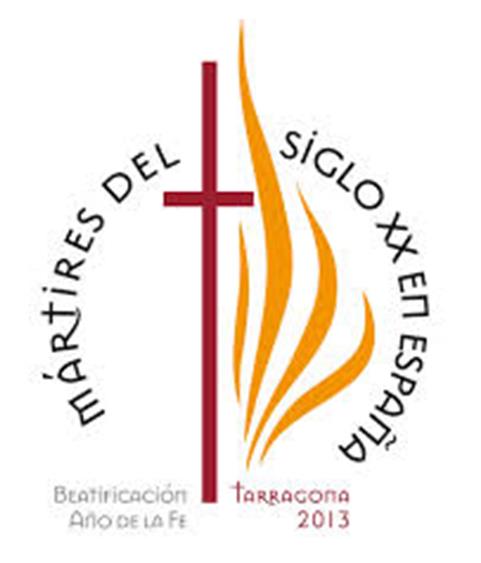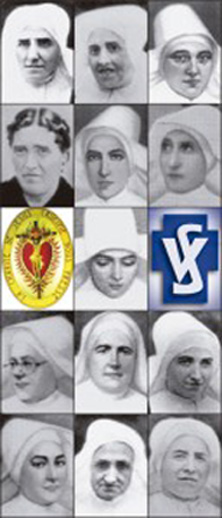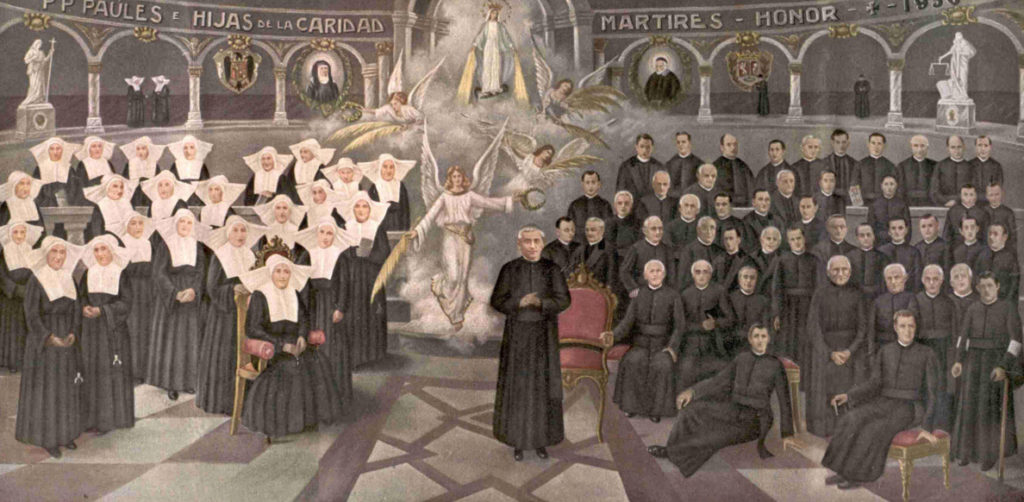Firm and Brave Witnesses of Faith – Spain
The twenty-seven Daughters of Charity martyrs, and the Daughter of Mary who accompanied them to martyrdom, are clear reflective witnesses of the Light of the Risen Christ whom they followed as witnesses of the Faith. These Sisters, as well as Fr. Fortunato Velasco Tobar and thirteen Vincentian confreres, were among the 522 martyrs beatified in Tarragona this October 13, 2013.
The martyrs are stars of Faith because they gave their lives to be identified with the true Light who told us about himself: “I am the light of the world. Whoever follows me will not walk in darkness, but will have the light of life.” (Jn 8, 12).
Following the author of the Apocalypse (Ap 7, 13-14) that speaks of the martyrdom of the first Christians, we will answer four important questions: Who are they? Where did they come from? How and why did they die? What challenges do they outline for us?
1ª) Who are the Daughters of Charity beatified in the Year of Faith?
a) They are simple women of their time, in their social origin, their family roots, and their education, their insertion in their home town and their form of living their faith. All had a wide background and they were qualified to carry out different services and to follow specialized studies. In general, they were cheerful women, full of hope.
b) They are women of firm Faith. The journey of Faith of these Sisters tells us of people without theological studies, but with hearts full of humility and simplicity. They received their Faith from their family; it was cultivated in school, parish catechesis, personal prayer and daily visits to the Blessed Sacrament. With simplicity they looked at the light of the will of God for orientation for their future life. They held to their Faith with stability amid persecution.
c) They are women of cultivated Faith through prayer and study. From their entry in the Company, they cultivated their Faith with simplicity, personal responsibility and care. The program of the Seminary was conceived to cultivate their Faith: prayer, study of the Gospel, Catechism of the Church, Rules of the Company, and biography of the Founders.
d) They are Daughters of Charity of brilliant Faith that radiated, communicated and expressed joy and simplicity because their heart was in Jesus Christ. They show it in spontaneous prayer, in their letters to their family and in their mission of service: care, work, prayer, fraternal relationships,… The testimonies of those who saw them living gives witness of this.
e) They are Daughters of Charity of proven Faith. If we look more deeply into their lives, in all of them we find the test of the Faith that will culminate in their martyrdom. They suffered personal pursuit, insults, slanders, abuses… They were object of the religious purification whose process sought to expel God from Welfare, Health Service and Education.
f) Some expressions of proven Faith: “I pray to God to give me the force to complete what He asks of me, and to suffer as much as He wants, until I will identify myself with Him… and, if it is God’s will, I would not have inconvenience in offering my life… “ (Sister Estefania Saldana Mayoral)
“She was very affected by the news… Who supposed that my dear mother would be so soon visited by illness?… there is nothing we can do but to ask for patience from God, who has visited us with these concerns, as hard as it seems, but they will be very praiseworthy… ” (Sister Maria Pardo Diaz)
“Sister Mª Asunción Mayoral was ready for martyrdom and she admitted it openly without paying attention to the threats and jeers of the militiamen. She encouraged the Sisters to accept their sufferings looking at the cross of Jesus Christ. … She had much zeal to bring souls to God.” (Sister companion of Mª Asunción Mayoral)
2ª) Where did these Witnesses come from?
a) They come from concrete geographical places: Three from Galicia, three Basque, another three from Navarra, two from Aragon, seven from Castile-Leon; three from Madrid, one from La Mancha, another from Plasencia (Caceres), two from Valencia, two from Andalusia and one from the Canary Islands .
b) They come from an historical moment of conflict in Spain: a situation of general crisis, unemployment, and poverty, dehumanized work conditions in the industrial and rural world, illiteracy, cultural and religious ignorance, street manifestations, strikes…
c) They come from a Church accused of being foreign to the people: the Church was blamed for social injustices originated by the world financial Crash of 1929 and its ensuing problems. The Church was persecuted with resentment and the religious institutions dedicated to Education, Charity, Health and Social Services underwent purification. Atheistic communism sought to banish the name of God from society.
d) They come from a service of the poor carried out as a mission: Five were Sister Servants: Sister Asunción Mayoral in the Blind Asylum of Madrid; Sister Mª Dolores Ursula Caro in the House of Mercy in Albacete; Sister Martina Vazquez Gordo in the Hospital and Schools of Segorbe (Castellón); Sister Josefa Laborra and Sister Carmen Rodríguez Barazal in the school-asylum of Betera (Valencia). All encouraged the Faith of their community in the moments of persecution and they looked for a priest to celebrate the Eucharist secretly. Sixteen were educators, seven were nurses and five were devoted to social work.
3ª) How and why did these Witnesses of Faith die?
a) They died admitting their identity and giving testimony of their Faith:
They lived and they died acknowledging Jesus Christ with courage, forgiving their persecutors and putting their lives in the hands of God the Father. They gave testimony to Christ with their life, their actions and to the value of following his teachings. They preferred to die than to give up their Faith and their vocation consecrated to Charity. When Sister Martina Vazquez Gordo was captured she interceded for her Sisters with the words of Jesus in Gethsemane: “If you are looking for me, leave them free, they can help you in the hospitals”… and her words were listened to.
b) They died because they were followers of Christ
The only crime for which they were interrogated and that they simply admitted to was “to be Daughters of Charity”… They died because they were Daughters of Charity, this was the only reason. Their persecutors wanted to erase the name of God in the work of Charity, Education and Health. But with their martyrdom they made it indelible forever.
4ª) What challenges do these martyrs outline for us? We enumerate some:
The martyrs of Faith of the XX century in Spain, and in particular our Sisters, lived their Faith amid a strong laicism, propagation of atheistic communism and environmental hostility. For that reason they were expelled from their communities, places of service and mission, threatened and persecuted. They used the means within their reach to try to save their lives. But the cunning of the persecutors was more clever than the Sisters good will and the persecutors found them. At the moment, there are quite similar circumstances to those in which they lived. Their lives challenge us and invite us to build the history of the future:
- the superficiality and comfort of today’s culture invite us to cultivate our Faith, to confess it with courage, and to live the Gospel deeply, closely uniting faith and charity.
- the selfishness and commercialism of society challenge us to live our vocation in evangelical freedom, to give what we have and what we are, with love and freedom and to manifest the love of Jesus Christ to the needy that surround us.
- the seeming obscurity of God and the lack of a sense of life for many people impel us to the commitment to evangelization of our surroundings, taking care of those who are far removed, impoverished and having all people who suffer at centre of our pastoral activity.
- the lack of humanity that is generated by globalization, the individualism and the economic and axiological crises call us to be more attentive to those in need, to spread understanding and to offer help to victims as witnesses of charity.
- in an atmosphere of tension and violence we can be, as they were: witnesses of mercy, kindness, pardon and reconciliation, bringing to reality the Beatitudes as a way of following Jesus Christ.
- in the face of anguish and the fear of a violent death, they trusted in God, they prayed, they increased their union and they celebrated the Eucharist to gather strength, to forgive and to confront death with Faith and serenity. It is a program of Christian life that is always in our hands, especially in any difficult situation.
The Sister martyrs didn’t improvise the strength and serenity of their final hour. It was a gift of the Holy Spirit, for which they prayed and that they welcomed; they were familiar with it because as Daughters of Charity they had been pilgrims of Faith, prophets of hope and witnesses of charity. They lived in this way and they died in this way leaving models for the history of the Church and the construction of a more human and loving world. This is their best legacy and their best lesson to us.
Sister Mª Angeles Infante, H. C.





